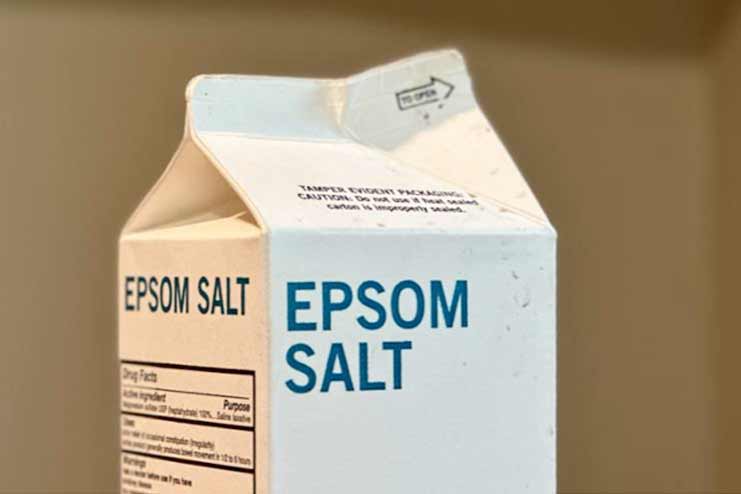Affiliate Disclaimer
Some links in this article are affiliate links. We may earn a small commission if you make a purchase through these links, at no extra cost to you. We only recommend products we find useful to our readersMagnesium sulfate, commonly referred to as Epsom salt, was discovered in the English town of Epsom in the 17th century. Epsom salt baths, well known for their healing qualities, have been used to treat various conditions, from stress alleviation to sore muscles. Although many people know its widespread applications, the goal of this article is to reveal twelve lesser-known advantages of Epsom salt baths that can improve your health.
What is Epsom Salt?

Magnesium sulfate, or Epsom salt, is a naturally occurring mineral compound that consists of magnesium, sulfur, and oxygen. It gained notoriety for its mineral-rich spring waters that possess extraordinary therapeutic qualities.
People have long used Epsom salt for its therapeutic and medical properties. It was frequently used as a laxative, an antidote for aching muscles, and a therapy for a variety of skin issues. Epsom salt has also long been used in the cosmetic industry to improve skin and hair health and in agriculture to increase soil fertility.
Because of their special makeup, Epsom salts are quickly absorbed into the skin, making them a great addition to baths and other topical treatments. Their adaptability and natural origins have solidified their place in both traditional and contemporary wellness practices.
How Epsom Salt Works

Magnesium sulfate, or MgSO4, is the chemical name for Epsom salt. Its composed of magnesium, sulfur, and oxygen. Magnesium is an essential mineral for the body since it is involved in more than 300 metabolic processes, such as creating proteins, controlling blood sugar, and maintaining muscles and nerves. Sulfate is essential for collagen synthesis, protein synthesis, and liver detoxification.
When dissolved in water, Epsom salt disintegrates into magnesium and sulfate ions. These ions are taken in through the skin during an Epsom salt bath, where they enter the bloodstream and support a number of physiological functions. Because the skin is a very porous membrane, and magnesium and sulfate travel through it more readily than through oral supplements, transdermal absorption is especially effective.
This procedure aids the body’s magnesium replenishment, relieves tense muscles, lowers inflammation, and encourages relaxation. Epsom salt baths are an effective means of promoting both physical and mental well-being because of the sulfate component, which helps to eliminate toxins and enhance general skin health.
12 Benefits of Epsom Salt Bath
Benefit 1: Relieves Muscle Pain and Soreness

The magnesium in Epsom salts greatly aids muscle relaxation and recuperation. When dissolved in a warm bath, magnesium ions released by Epsom salts are absorbed via the skin, easing pain and cramping in the muscles. Studies have shown that magnesium may lessen the likelihood of cramps and spasms by helping to control muscular contractions. Epsom salt baths are a staple among athletes and fitness enthusiasts, who credit the mineral’s ability to relieve sore muscles and expedite the healing process for their post-workout recovery routine.
Benefit 2: Reduces Stress and Promotes Relaxation

Magnesium’s ability to lower tension and encourage relaxation is widely recognized. During Epsom salt bath, the skin absorbs magnesium, which aids in synthesizing serotonin, a neurotransmitter that improves mood and promotes calmness. Additionally, Epsom salt baths can enhance sleep quality by soothing the mind and relaxing the muscles. Regularly taking an Epsom salt bath before bed can be a straightforward but powerful method to lower the stress levels and improve the quality of your overall sleep.
Benefit 3: Soothes Skin Conditions

People with skin disorders, including eczema, psoriasis, and acne, might find significant relief by taking Epsom salt baths. Epsom salt’s natural antibacterial capabilities can prevent infection, while its anti-inflammatory and exfoliating qualities help lessen redness, irritation, and flakiness. Experts advise soaking in an Epsom salt bath for at least 15 to 20 minutes to allow the minerals to permeate and relax the skin for the best possible skin benefits . A few drops of the essential oils, such as tea tree or lavender oil, can boost healing properties and offer more comfort.
Benefit 4: Improves Circulation

Enhancing blood flow and circulation is crucial for maintaining cardiovascular health. Epsom salt baths help with this. Epsom salt’s magnesium content facilitates blood vessel relaxation and dilation, which improves blood flow throughout the body. Enhanced blood flow helps tissues receive more oxygen and nutrients, accelerating healing and lowering inflammation. According to specific research, regular Epsom salt baths may improve cardiovascular function, maintain heart health, and reduce the risk of cardiovascular illnesses.
Benefit 5: Aids in Detoxification

Baths with Epsom salt are well known for their ability to cleanse the body by drawing out pollutants and poisons. By binding to heavy metals and other toxins and enabling their removal, the sulfates in Epsom salt assist the liver to detoxify the body. A well-liked detox bath recipe calls for mixing two cups of Epsom salts with half a cup of baking soda and a few drops of aromatic oils in a warm bath. Soaking in this mixture for 20 to 30 minutes can help detoxify the body, lessen bloating, and enhance general well-being.
Benefit 6: Alleviates Headaches and Migraines

Epsom salt baths are a valuable treatment for migraines and headaches. A major cause of migraines is magnesium deficiency. Taking an Epsom salt bath relaxes muscles and blood vessels, lessening the frequency and intensity of headaches. Including regular Epsom salt baths to wellness routines will provide significant relief for many individuals suffering from severe migraines.
Benefit 7: Supports Healthy Joints

Epsom salts have anti-inflammatory qualities that can help those with arthritis and joint discomfort. Frequent Epsom salt baths improve mobility and lessen discomfort by lowering edema and inflammation in the joints. Maintaining healthy joints also requires supporting the health of cartilage and connective tissues, which magnesium in Epsom salts provides. Epsom salt baths can be a very natural and helpful technique to treat symptoms and improve joint function for people with chronic joint pain.
Benefit 8: Promotes Better Sleep

Magnesium has a direct correlation with relaxation, better sleep, and relaxation. Baths with Epsom salts are a great way to increase magnesium levels in the body, which help with relaxation and hormone production that regulates sleep. Before going to bed, a warm Epsom salt bath can help lower cortisol levels, ease anxiety, and prepare the body for a good night’s sleep. To establish a bathing regimen before bed, pour two cups of the Epsom salts into a warm bath, let yourself soak for at least twenty minutes, and then sip on a soothing herbal tea to help you relax.
Benefit 9: Enhances Skin Hydration

Epsom salt baths complement any skincare regimen greatly since they help the skin maintain moisture. Epsom salt’s magnesium fortifies the skin’s barrier, reducing evaporation and enhancing hydration. Add nutritious substances to your bath, such as oatmeal or coconut oil, along with Epsom salt, for even more skin advantages. To seal in the moisture, gently pat the skin dry after soaking and then apply a moisturizer. This easy routine will make your skin incredibly moisturized, smooth, and silky.
Benefit 10: Boosts Magnesium Levels

Magnesium is necessary for good health since it is involved in many body processes, including the production of energy, the control of blood sugar, and the function of muscles and nerves. A quick and efficient strategy to increase the magnesium levels is to take Epsom salt bath, especially for people who might not get enough from their diet. Bypassing the digestive system and offering instant effects, magnesium can be quickly absorbed through the skin when soaking in an Epsom salt bath. Frequent Epsom salt baths improve general health and well-being by maintaining adequate magnesium levels.
Benefit 11: Reduces Inflammation

The potent anti-inflammatory properties of Epsom salt can help lower inflammation all over the body. This may be especially helpful for inflammatory diseases like arthritis, strained muscles, and other disorders. Epsom salts include magnesium, which aids in regulating inflammatory reactions and lowering oxidative stress to aid in pain relief and healing. Numerous studies have shown magnesium to have anti-inflammatory qualities, which supports its use in treating inflammatory disorders. Frequent Epsom salt baths can be a safe, all-natural method of lowering inflammation and enhancing general health.
Benefit 12: Improves Foot Health

Ingrown toenails, athlete’s foot, and bad odor can all be effectively treated with Epsom salt. Epsom salt’s antimicrobial and antifungal qualities aid in the fight against infections, while its exfoliating qualities help to soften calluses and remove dead skin cells. A bare-foot bath recipe calls for soaking your feet for 15 to 20 minutes after dissolving half a cup of the Epsom salt in a basin of warm water. This will help relieve sore feet.
Conclusion
From easing skin ailments and enhancing circulation to treating muscle pain and lowering stress, epsom salt baths have many unexpected advantages. These multipurpose baths will improve skin hydration, promote healthy joints, reduce headaches, and help detoxify. Epsom salt baths enhance general health and well-being by increasing magnesium levels and lowering inflammation. We urge you to include Epsom salt baths in your daily regimen to benefit from these less well-known advantages.
-
Nov 2019Written by Somapika D
-
Aug 2024Edited by Ankita
In this Article
















